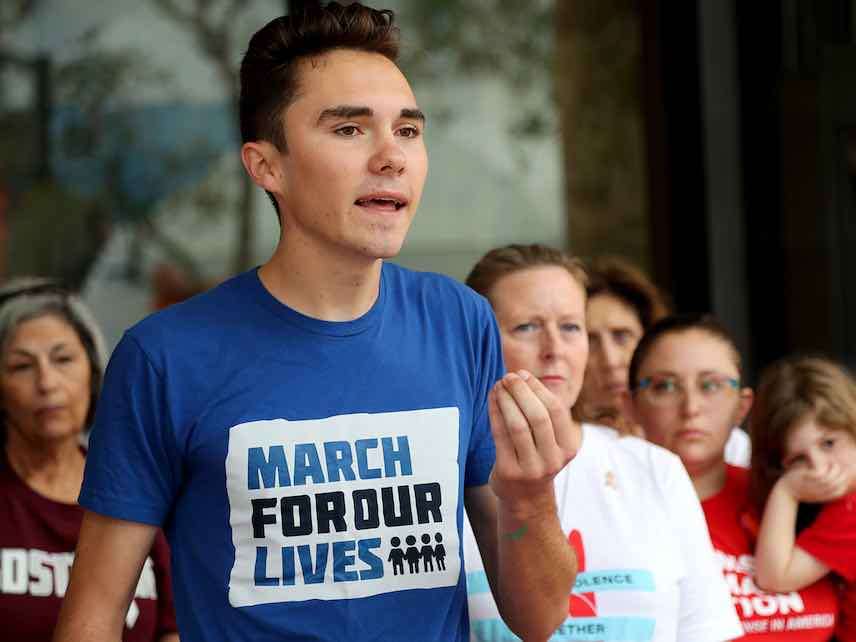One Year Later, Parkland Remains a Stunning Example of Police Incompetence
The mass shooting became a story about gun control. But it's also a story of incomprehensible government failure.

For most people—including the teenagers who lived through it, and then became national advocates for the anti-gun cause—the February 14, 2018 mass shooting at Marjory Stoneman Douglas High School in Florida was primarily about one thing: how easy access to firearms leaves schools fundamentally unsafe.
"Our school could be next," a 13-year-old told me when I interviewed her at the 2018 March for Our Lives rally in Washington D.C., held a month and a half after the events in Parkland, Florida. "What if it is?"
This message was echoed by the well-spoken, telegenic, and unbelievably driven survivors of the Parkland shooting: David Hogg, Emma Gonzalez, and their friends.
Today marks one year since Nikolas Cruz, a disturbed teenager and former Stoneman Douglas High School student, walked into the school and murdered 17 of his ex-classmates. In the months since the attack, Parkland activists have made some headway on behalf of gun control: The Florida legislature passed a "red flag" law that empowers courts to take guns away from purportedly dangerous people, and raised to 21 the minimum age to purchase a gun. At the federal level, President Trump signed an executive order that banned "bump stocks"—an after-market gun modification that allowed Las Vegas shooter Stephen Paddock to fire more rapidly.
But though the activists and most of the media have focused on guns and what to do about them, there's another story to be told about Parkland—one that Broward County's local paper, The Sun-Sentinel, has done a praiseworthy job of telling.
It's the story of catastrophic failure at every level of law enforcement, beginning with a corrupt and incompetent sheriff's office warned on multiple occasions about the specific threat posed by Cruz. The Broward County sheriff's office received at least 18 tips between 2008 and 2017 concerning Cruz. A November 2017 caller described him as a "school shooter in the making." Despite knowing that Cruz was in possession of a cache of weapons, the sheriff's office passed the buck, expecting a different police authority to handle it.
On the day of the shooting, a Broward County school resource officer beclowned himself. School Resource Officer Scot Peterson, an employee of the sheriff's office, refused to enter the school and confront Cruz, as did three Broward County Sheriff's deputies who had arrived on scene. These were stunning indictments of Broward County Sheriff Scott Israel, a man who responded to accusations of corruption by comparing himself to Abraham Lincoln, Ghandi, and Martin Luther King. "Lions don't care about the opinions of sheep," he said, paraphrasing a Game of Thrones villain.
As questions about his leadership mounted, Israel remained defiantly proud of his behavior—boastful, even. When asked if his office should have handled things differently, he shrugged. "If its and buts were candy and nuts, O.J. Simpson would still be in the record books," he told CNN's Jake Tapper.
Florida Gov. Ron DeSantis (R) fired Israel, a Democrat, shortly after taking office. But the failures do not end with the sheriff. The FBI itself was told about Cruz's instability just days before the attack but "processes… were not followed," according to an FBI spokesperson, and the tip was ignored.
Gun control and government incompetence are not unrelated subjects. Generally speaking, the logic of gun control rests on the idea that public safety can be trusted to the police. People don't need guns because the government is protecting them.
That's why law enforcement's spectacular failure before, during, and after the Parkland shooting should be a more pressing topic of discussion. When we talk about various strategies for disarming the public—most of which are law-abiding citizens who do not use guns inappropriately but might want them for self-defense—we should not forget that these strategies place implicit trust in government agencies to protect us from all threats. Every day, as was the case with Parkland, many of these agencies prove themselves to be wildly incompetent for reasons ranging from arrogant leadership and individual cowardice, to toxic workplace culture and shoddy internal systems.
The mantra of post-Parkland activism is that every kid has the right to feel safe. The myriad failures of police bureaucracies at the local, state, and national level raise serious questions about whether the government can provide such guarantees.


Show Comments (111)